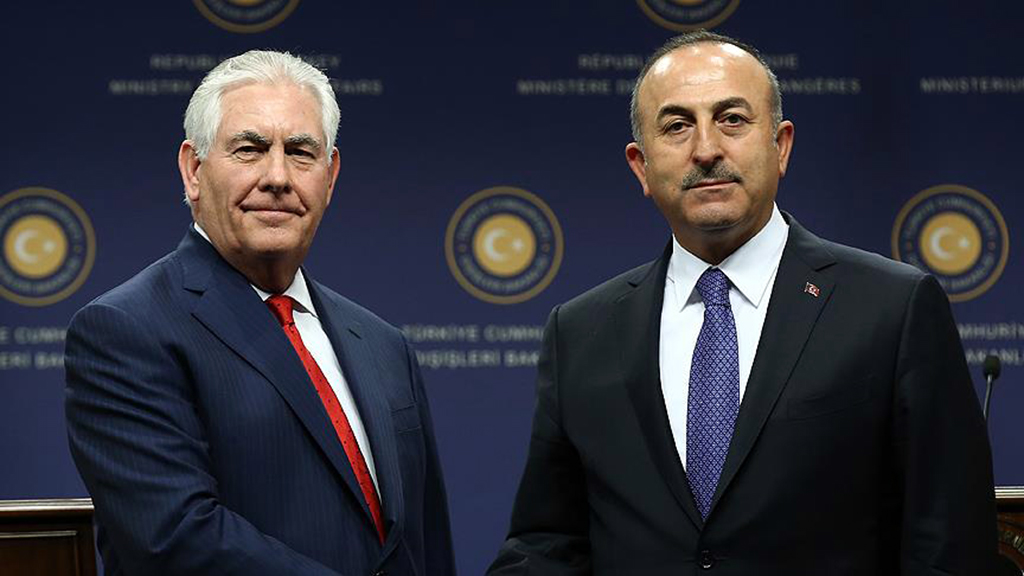
Perpetual ups and downs in Ankara-Washington negotiations
Tt was reported this week that Turkish and U.S. delegations will start their meetings next week.
Share
It was reported this week that Turkish and U.S. delegations will start their meetings next week. A few weeks ago during their meetings in Ankara, Foreign Minister Mevlüt Çavuşoğlu and U.S. Secretary of State Rex Tillerson decided to establish some working groups to resolve the problems that exist between Turkey and the U.S. It is a positive sign for the future of bilateral relations since in a joint statement they demonstrated the goodwill and commitment to recognize and resolve the problems between the two countries. However, there are several issues that Turkish policy makers and public are expecting as a result of these meetings. The U.S. side should be cognizant of these expectations. First of all, it should be very clear by now that something needs to be done in regard to the People's Protection Units (YPG) issue. Former U.S. President Dwight Eisenhower once said, "Plans are nothing; planning is everything." In Turkey-U.S. relations due to the failure of the U.S. to fulfill its promises, today promising is nothing and action on those promises are everything. There should be some positive steps from the U.S. side in order to start the healing process in the relations. The promises about this issue may mean only little due to the problems in mutual trust between the two countries. On the positive side, the current state of relations make threshold really low in regard to the improvement in relations. So, a small step will bring important improvements in the relations. That step can start with the fulfillment of the U.S. promises in Manbij.Secondly, the interagency disputes in Washington do not reflect well in Turkey. Regardless of who made the statement it is considered a position of the U.S. administration. The U.S. Central Command's (CENTCOM) statement about the border protection forces composed of YPG members made sufficient damage in relations until Tillerson's statement came after a few days. This interagency struggle started to be considered an excuse by large segments of society in Turkey. Because of that, in regard to the critical foreign policy issues, clarity of the message is extremely important. Of course, the policy on Syria at this point needs to be clarified as well by the U.S. administration. CENTCOM Cmdr. Gen. Joseph Votel's statement on the U.S.'s Syria policy during his testimony at Capitol Hill was somehow in contradiction with the goals Tillerson put forward in his Syria strategy speech a few weeks ago. This is confusing U.S. allies and other countries in the region about the real goals of Washington.
Thirdly, the public messaging will be important in one of the most sensitive period of the relations. The committees need to focus on this issue. This is related with the interagency problem in Washington but it also has a different angle on it. The statement of U.S. State Department spokesperson Heather Nauert about the U.N. Security Council (UNSC) resolution on a cease-fire and its applicability to the Turkish operations in Afrin was an unfortunate intervention to the process of healing. Çavuşoğlu and Tillerson's statements explicitly recognized that the parties should respect the right to self-defense in case of a terrorist threat.
Furthermore, the UNSC resolution, which aimed to end the humanitarian crisis in some of the areas of Syria, was never mentioned the Turkish operation in Syria. Thus, Nauert's stance can generate a public reaction in Turkey against the U.S. especially while the Turkish Foreign Ministry and the U.S. State Department are working to resolve the problems, such statements will put both the negotiators' under immense amount of pressure and risk the success of the working groups. In fact, considering the significance of public opinion in foreign policy in Turkey, the U.S. side might consider being more sensitive on the issue of the Afrin operation. A statement of support for the operations in Afrin can be meaningful at this point, considering there is a widespread belief that the U.S. did not appreciate the trauma that the Turkish people went through as a result of the terrorist attacks that took place in Turkey over the last three years.
To understand these sensitivities will be important for the meetings that will take place next week and of course for the future of bilateral relations between the two countries as well.
[Daily Sabah, 3 March 2018]
Tags »
Related Articles






